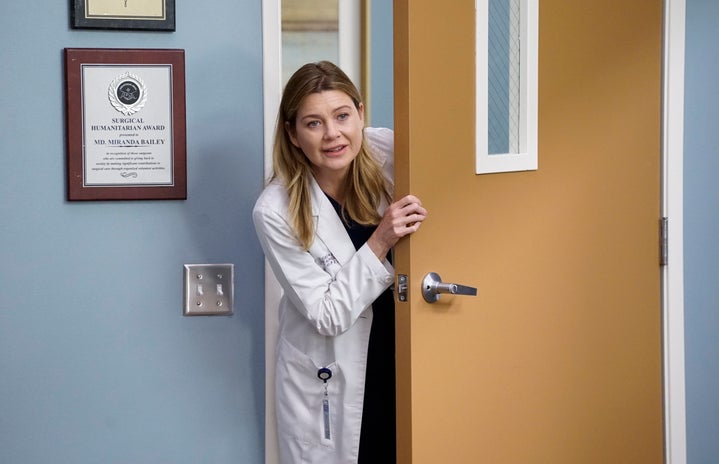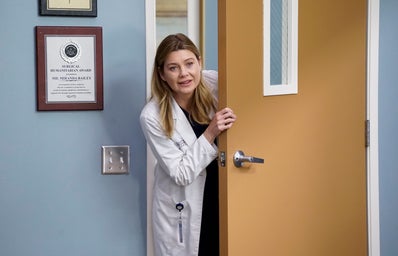I’m proud to say that I’ve seen every single episode of all 17 seasons of the wildly popular medical drama Grey’s Anatomy. Grey’s premiered March 27, 2005, over 16 years ago, and longtime fans of the show have seen it morph from a soapy medical drama to a show about grief, and then back to a soapy medical drama. With the onslaught of Covid-19, Grey’s shifted gears to accommodate the pandemic, but putting their title character in a coma for the entirety of the season so far has forced the show to focus on characters they don’t care about. It’s no wonder that the latest season has the lowest audience score out of all 17 seasons. But the truth is that Grey’s stopped being good a long time ago, and the show’s longevity is the major part of the problem.
Every true Grey’s Anatomy fan knows that the show can be split up into different “stages,” divided based on character exits. The show’s most popular stage is seasons 4-8, which includes most of the main cast and original characters (by this point in the show, we’d only had one surprising character death). Unfortunately, with a long-running show like Grey’s, actors begin to leave to pursue other opportunities, which had a heavy impact on both the storylines and cast of the show. Halfway through season 16, with the exit of Justin Chambers, who played Alex Karev, only three original cast members remained: Ellen Pompeo, who plays Meredith Grey, Chandra Wilson, who plays Miranda Bailey, and James Pickens Jr., who plays Richard Webber. A revolving door of characters is not necessarily a bad thing. There’s a long list of characters on Grey’s that were not there for season 1 that have quickly become fan favorites, like Amelia Shepherd (who appeared in Season 7), Owen Hunt (who appeared in Season 5), and Jo Wilson (who appeared in Season 9). But with a show like Grey’s, who would prefer a tragic exit like being hit by a semi-truck or dying in a freak plane accident than a regular one, the frequent exits became infamous on the show. Fans of the show would often pose the question, “If all the doctors at Grey-Sloan seem to die horrific deaths… wouldn’t they just stop working there?” Not to mention that Grey’s is supposed to be somewhat realistic, and there’s only a certain number of tragedies that can occur to a single hospital.
There’s also been another consequence of character departures: apparently, love at Grey-Sloan Memorial Hospital doesn’t exist. A majority of the appeal of Grey’s anatomy is the love stories, but there are currently only two couples that have survived the course of the show. The main couple of Grey’s Anatomy, “MerDer” (Meredith Grey and Derek Shepherd), was the show’s heart for 11 seasons. Grey’s was not planning for Patrick Dempsey leaving when writing their romance, and it felt like a gut punch when Derek Shepherd was unceremoniously killed in Season 11. Other examples include Callie Torres and Arizona Robbins’ build up, which eventually ended in divorce and Callie leaving the show. This was devastating to fans because “Calzona” provided some much needed LGBTQ+ representation in television. By far the greatest blow, however, was the unceremonious writing off of fan favorite Alex Karev. The writers undid several seasons of character development in order to accommodate Chamber’s much-needed exit, which incurred extreme backlash from viewers. For longtime fans, what’s the point of rooting for any fan favorite if they’re inevitably going to die or get divorced?
Another issue with Grey’s Anatomy is a simple fact that they have exhausted many plausible storylines. Couples have broken up and gotten back together, and it seems like they’ve exhausted every available pairing. Meredith Grey has survived a bomb, drowning, a shooting, a plane crash, a fire, and possibly, Covid-19. The latest ploy to garner views, especially from fans of the earlier (and objectively better) seasons of the show, is to put Meredith in a coma and have her visit with former characters that have died. The fact that there are enough dead characters for Meredith to have conversations with to fill 11 episodes is already a bit of a red flag, but the reliance on old characters to fill the season should serve as a sign that Grey’s has fully run its course. One could argue that shows should continue as long as there are stories to tell, but does Grey’s have any left?



